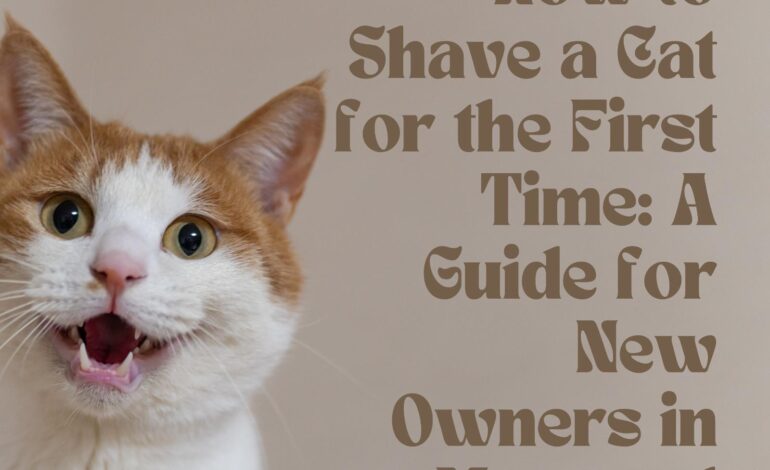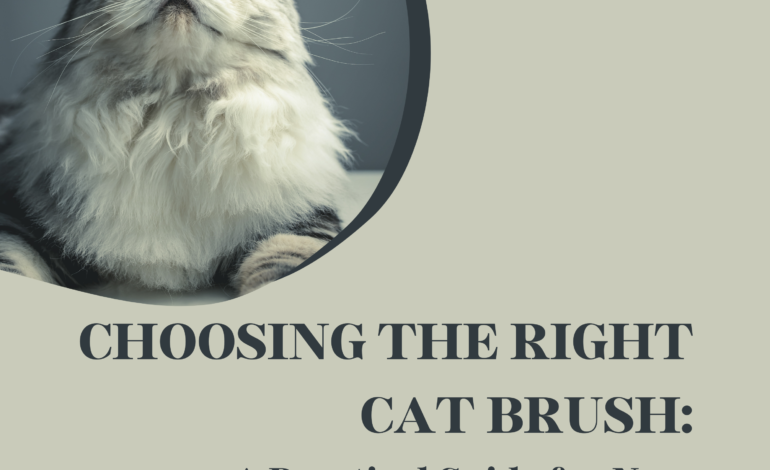How Do Cats Feel After Being Brushed? (Helpful Guide for Pet Owners)
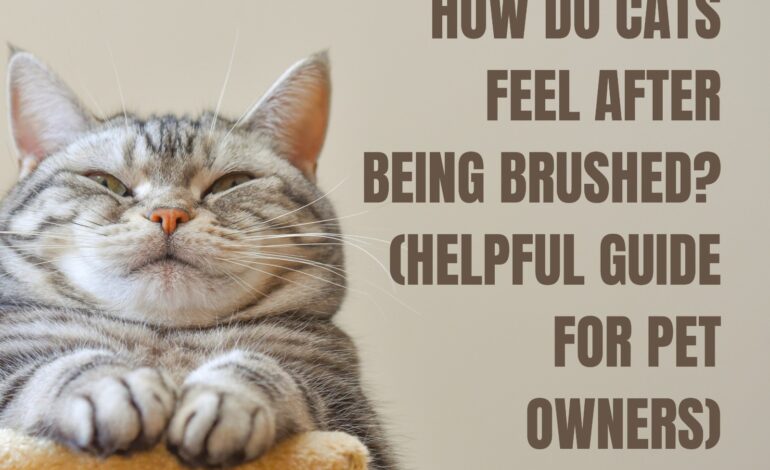
Cats are really interesting pets that have their own personalities and their peculiarities. Cats are devoted to personal hygiene. Studies indicate that they could use about 30-50 percent of their time awake grooming, (1) leaving many pet owners with the question: do cats like to get brushed and how do cats feel when they are brushed? It is not about all cats purring, calming down, and kneading at the brush, or hissing or escaping.
Brushing is not only about appearance; it keeps the fur thin and off, keeps it free of mats, decreases the number of hairballs that lead to digestive obstructions, and the bond between the human and the pet. Nevertheless, when a cat does not like to brush, it is necessary to change the technique or instruments.
This guide will discuss how cats respond to brushing, why some cats do not like to be brushed, and some tips that help you brush your cat. In conclusion, you will know how to read the body language of your cat and what to do in case you have ever wondered, why does my cat dislike being brushed?
Do Cats Like Being Brushed?
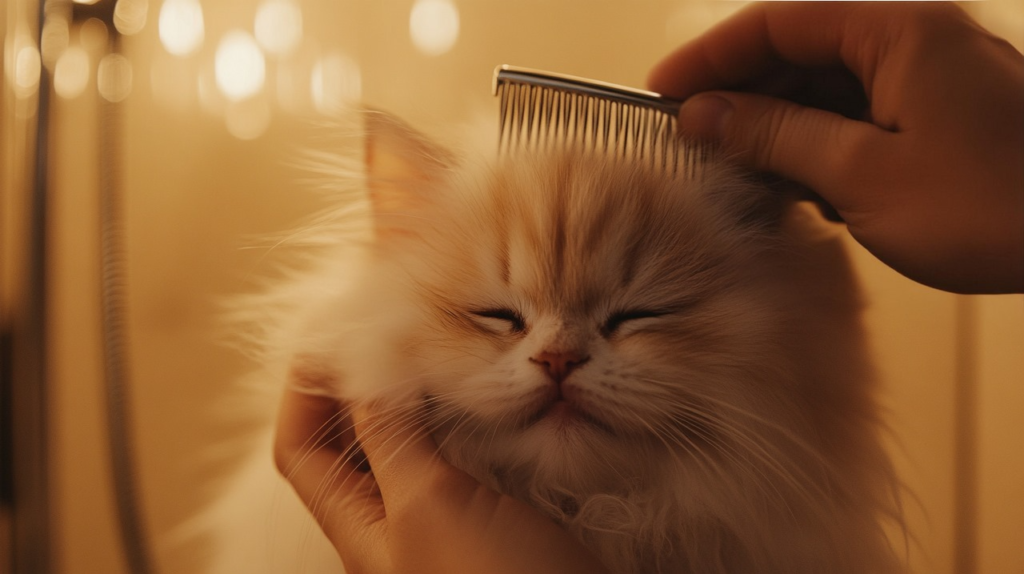
Allogrooming is similar to brushing in many cats and in natural colonies serves to strengthen social relationships. The cats that like it will usually purr, knead or head-butt since the strokes are just like a massage and disperse natural oils on the coat. During a study on feline behavior, it was found that the quality of the coat and the bond connecting the cat and the human was enhanced by short time brushing sessions that were daily.
Conversely, other cats are not cohesive with brushing. Sensitivities can be due to previous unpleasant treatment, the skin being pulled by painful mats, or medical problems, such as arthritis, that cause some areas to become tender. Cats that have sensitive skin or skins that are too thin might find brushing to be over-stimulating instead of calming. Research also demonstrates that attempted forced grooming may raise stress markers in cats and result in avoidance or defence behaviours.
The trick lies in understanding that every cat reacts to this process differently- even though brushing is a soothing and healthy action, not all cats will be having the same experience.
Understanding Cats and Grooming Habits
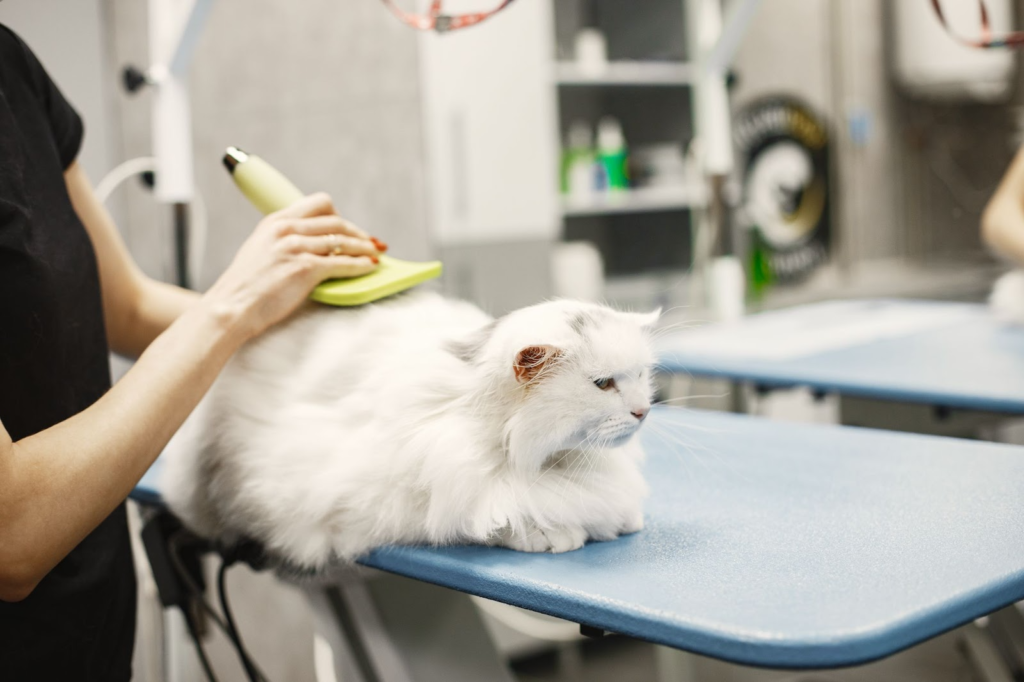
1. Natural Groomers by Design
Cats spend 30-50 per cent of their day grooming. Nor are they mere for show, them of those rough little tongues: of hollow backward-facing papillae that form combs made of hollows. They push about 48 mL of saliva through the coat together on a daily basis and this aids in cleaning and even cooling. Actually, grooming may contribute up to 25 percent of a cat’s heat loss. But in long-haired breeds the tongue is often unable to reach the skin, so brushing is a necessary supplement. (2)
2. Social and Emotional Dimensions
In addition to self-care, cats perfect allogrooming (grooming other cats). Interestingly work has revealed that during about a third of allogrooming, cats sneak in some swats or other kind of dominance indicators so it is not necessarily all affection but a kind of negotiated socializing mechanism. This bonding behavior can be replicated by brushing by human beings, building trust in the process when introduced in a subtle way. (3)
3. A Window into Health
Alterations in grooming behavior are significant diagnostic hints: rapid reduction of grooming would be a sign of pain or arthritis, whereas an abundance could be a clump of skin irritation, stress, or compulsions. In this way, brushing does not only keep the coat healthy, but also allows owners to pay closer attention to wellbeing.
4. Allergy Considerations
There is another role of brushing in the case of allergy-prone households. The Fel d 1, the major allergen, is highest on the head and the neck. It has been shown that brushing or bathing may temporarily reduce airborne Fel d 1 the primary cat allergen four to five times. The effect continues to last a day or two, yet through frequent grooming may have an influence that can still reduce the burden on allergy-sensitive families. (4)
How Do Cats Feel After Being Brushed?
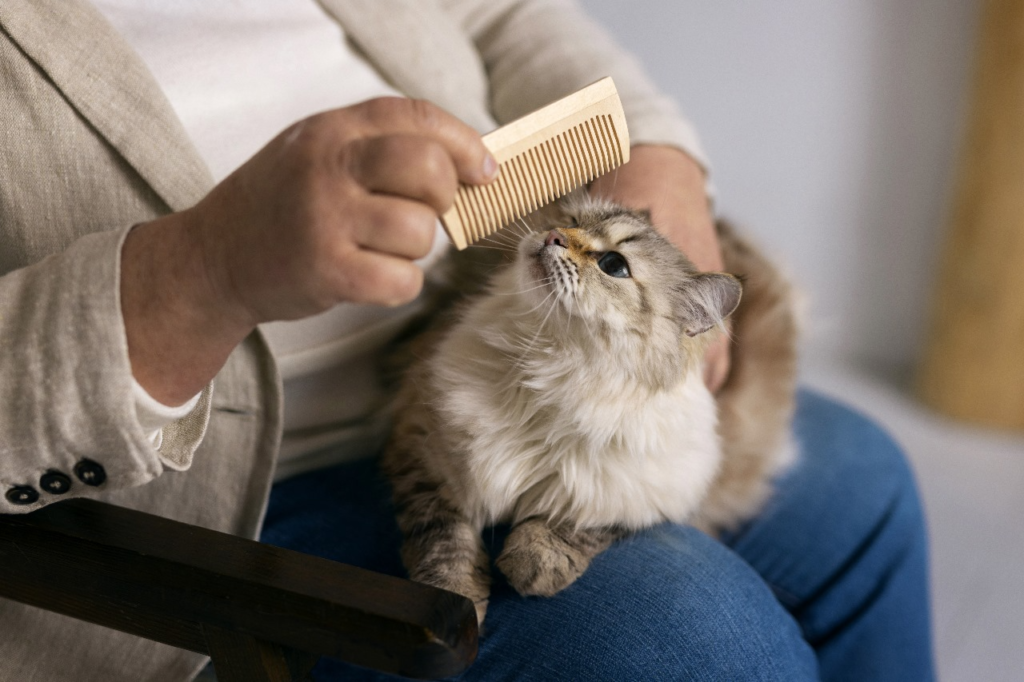
Cats who love to be brushed usually are relaxed, and safest, exhibiting such behavior as purring, kneading, or lying. Cat owner surveys revealed that out of every six or more cats, more than 60 percent of owners reported that their cats appeared more relaxed and more affectionate after routine regular and gentle brushing.
In comparison, cats which become annoyed with brushing can be stressed or scared. Studies of cat handling reveal that as many as one out of every three cats will become agitated or avoidant- tail flicking, flattened ears, trying to escape- when brushed in an uncomfortable or coercive manner.
Signs Your Cat Enjoys Brushing
- Purring and kneading – When cats purr or tap the ground with their paws in time, when brushing them, it can be seen that they are comfortable and relaxed. This is something that is normally observed in the process of bonding or nursing and is an indicator that the cat views brushing as a calming activity.
- Leaning into the brush – Pushing its head, cheeks or body into the brush, a cat is demonstrating that it is personally fond of it. This is a replica of natural scent-marking behavior, as cats do have scent glands in their cheeks, and carries a message that the cat enjoys brushing.
- Slow blinking and relaxed posture – Cats that blink slowly or have a loose, relaxed, stretched out posture when they are being brushed are demonstrating the presence of trust and ease. Feline behavior studies have identified the slow blink in feline behavior as being a social bonding behavior, akin to human smiling.
- Exposing the belly – Rolling over or exposing the stomach is among the best signals of trust that cats give. Not every cat likes tickling the belly but in the process of brushing, they are sure that they are safe. Over 50 percent of cats exhibited trust-based behaviors, such as rolling or side-stretching in case of a positive introduction of grooming in owner surveys.(5)
Signs Your Cat Dislikes Brushing
- Sensory sensitivity – Some cats are highly touch-sensitive; brushing may trigger twitching, tail swishing, or escape attempts. Studies show about one-third of cats display stress behaviors during grooming.
- Past negative experiences – Rough handling or painful mat removal can create long-term aversion, as cats quickly associate brushes with discomfort.
- Wrong brush or technique – Hard bristles or tugging mats can hurt, especially in long-haired breeds, making cats resist brushing.
- Medical issues or mats – Skin problems, fleas, arthritis, or tangled coats make brushing painful; according to a UK study, about 1 in 8 Persians (12.7%) suffer from coat-related problems highlighting how important regular brushing is for long-haired breeds.(6)
Benefits of Brushing Your Cat
- Reduces shedding & hairballs by removing loose fur.
- Prevents mats & tangles that can cause pain or infections.
- Boosts coat shine & skin health by spreading natural oils.
- Relieves stress with a calming, massage-like touch.
- Detects health issues early like fleas, wounds, or skin changes.
- Strengthens your bond by mimicking natural grooming.
Tips for Brushing Your Cat
- Pick the right brush – use soft-bristle brushes or grooming gloves, especially for sensitive cats.
- Start slow – allow your cat to sniff and get used to the brush before grooming.
- Build a routine – regular sessions at the same time help cats feel secure.
- Brush gently – keep sessions short and calm to avoid overstimulation.
- Use positive reinforcement – reward with treats, praise, or play so brushing becomes enjoyable.
How to Help a Cat That Dislikes Brushing
| Strategy | How It Helps |
| Desensitization | Place the brush nearby and gently introduce it over time, reducing fear and building comfort. |
| Positive Reinforcement | Reward with treats, praise, or play to create a positive link with brushing. |
| Start with Favorite Areas | Begin on the back, cheeks, or sides before moving to sensitive spots. |
| Short, Calm Sessions | Keep grooming brief and gentle to avoid overwhelming your cat. |
| Professional Support | Groomers or vets can help with mats, skin issues, or highly fearful cats. |
Conclusion: Making Brushing a Positive Experience
When you brush your cat, you don’t just do it to get rid of free fur; you do it to spend quality time with it and to strengthen your bond. If your cat doesn’t like to be groped, with time, the appropriate bristle brush, and a gentle approach, it can turn into a very relaxing experience. If you time the brushing with the cat’s signals, bring out the brush very slowly, and only brush when you see the cat behaving calmly, it will become a bonding exercise rather than a chore. In the end, you will see shiner coats, a cat that doesn’t hack furballs and a much calmer and happier companion. 🐾
Would you like to know some tips that can help keep your cat happier and healthier? For other guides consisting of products and marks related to brushing, and general cat wellness, visit the Meow Care Hub because it is a trusted resource for cat owners.
FAQs About Brushing Cats
1. Do cats like being brushed?
Some cats love it and see it as bonding time, while others may dislike it due to bad experiences or sensitive skin.
2. How do cats feel after being brushed?
Cats often feel relaxed and happy if they enjoy the session, but stressed if brushing causes discomfort.
3. Why does my cat dislike being brushed?
Possible reasons include medical issues, wrong brushes, painful mats, or past trauma.
4. What are the benefits of brushing my cat?
Brushing helps prevent mats, reduces shedding, minimizes hairballs, improves coat health, and boosts bonding.
5. What’s the best way to introduce brushing?
Start slowly, let your cat explore the brush, keep sessions short, and reward them afterward.
6. How often should I brush my cat?
Long-haired cats may need daily brushing, while short-haired cats often do well with weekly sessions.
7. Can brushing improve my bond with my cat?
Yes — regular, gentle brushing builds trust and strengthens your relationship.
Resources:
- https://www.vet.cornell.edu/departments-centers-and-institutes/cornell-feline-health-center/health-information/feline-health-topics/cats-lick-too-much
- https://www.nationalgeographic.com/animals/article/understanding-cat-tongues-papillae
- https://link.springer.com/article/10.1007/BF02896348
- https://aacijournal.biomedcentral.com/articles/10.1186/s13223-018-0239-8
- https://www.petscare.com/news/post/do-cats-like-being-brushed
- https://www.rvc.ac.uk/vetcompass/news/persian-cats-at-high-risk-of-health-problems-study-shows

